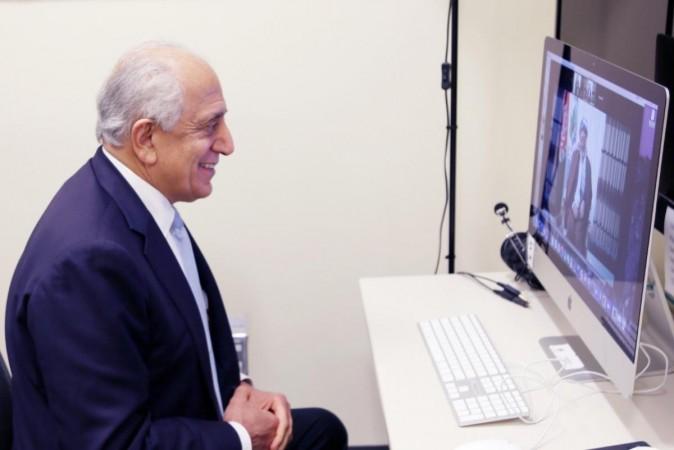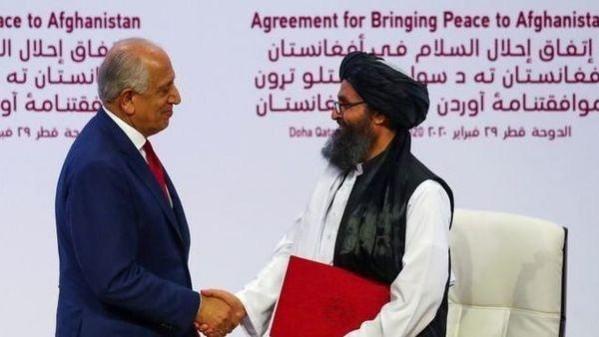Who is responsible for the return of the Taliban? While there may not be one single factor responsible for the current state of destruction and violence in Afghanistan, the buck clearly stops with Zalmay Khalilzad.
He's one man who claimed, and was equipped to handle it all, but clearly couldn't. As the US Special Representative for Afghanistan Reconciliation, he is the chief architect behind US-Taliban deal and the American pull-out, following the deal.

Who is he?
The 70-year-old Afghan-born US diplomat was appointed as the special US envoy about three years ago. His knowledge of Afghan culture, its nuances and fluency in Persian and Pashto languages weighed in his favour for the job.
Moreover, as a man who had served in both Afghanistan and Iraq as a US envoy, he exerted a lot of power and influence in the reconstruction of Afghanistan under US occupation. Naturally, he also led Washington's talks with the Taliban.

But several reports hinting at his business dealings with the Taliban before 2001 attacks have cast a serious doubt on his intentions and integrity. This could have been the precise reason why he has been a controversial and untrusted figure in Afghan-Taliban-US equation from the start.
Khalilzad has advocated the terrorist organisation through statements more than one. Sometimes by implying through his words that the Taliban "have changed and are not the same group."
What did he do…and did not do?
At the Aspen Security Forum last week, Khalilzad said that the Afghan government was too weak to win a negotiated settlement without a new military strategy. He also said that it was necessary for the Afghan government to, "find its military bearings."
Unfortunately, this statement came on the day a car bomb blast and sporadic gunfire were reported from Kabul's heavily guarded Green Zone. In that attack, Afghan defence minister General Bismillah Mohammadi survived the assassination attempt, but several civilians and Taliban members died in the attack. A day later, Taliban claimed responsibility behind the attack and in the week that followed, a senior government official was shot dead.
At the time of February deal
Reverse back to February of 2020 and the deal that led to US troop pull-out, Khalilzad said that peace could only be restored through a ceasefire and the negotiations that would lead to a transitional government in Afghanistan.
Rather than digging further into the genuineness of Taliban confessions and promises, Khalilzad reportedly put pressure on the Afghan government to release the thousands of insurgent prisoners. Today those prisoners are only strengthening the Taliban military.
US lawmaker Michael Waltz, wrote to Biden on Khalilzad's performance, "He has provided you with poor counsel and his diplomatic strategy has failed spectacularly. In light of this catastrophe, he should be resign immediately or be relieved from his position."
There was no doubting Waltz apt judgement which proved right in no time. On August 13, Zalmay tweeted, "We demand an immediate end to attacks against cities, urge a political settlement and warn that a government imposed by force will be a pariah state." But who was listening?
Where did he go wrong?
Several editorials and opinion pieces in the US media have pointed out his inability to negotiate a meaningful peace process and how he should have been called back home long ago.
Those closely monitoring the US-Taliban developments, remember how Khalilzad secured the release of Taliban co-founder Mullah Abdul Ghani Baradar from Pakistan's custody as a first step towards the process.
During the months of negotiations that followed, his association with the Taliban delegation became a subject of close scrutiny and serious allegations. Online pictures showed a gregarious diplomat and his friendly chemistry with the insurgent negotiators. Today, it seems Afghanistan is paying for those laughs and smiles.








![BJP fields Tashi Gyalson for Ladakh; drops sitting MP [details]](https://data1.ibtimes.co.in/en/full/797185/bjp-fields-tashi-gyalson-ladakh-drops-sitting-mp-details.jpg?w=220&h=138)








